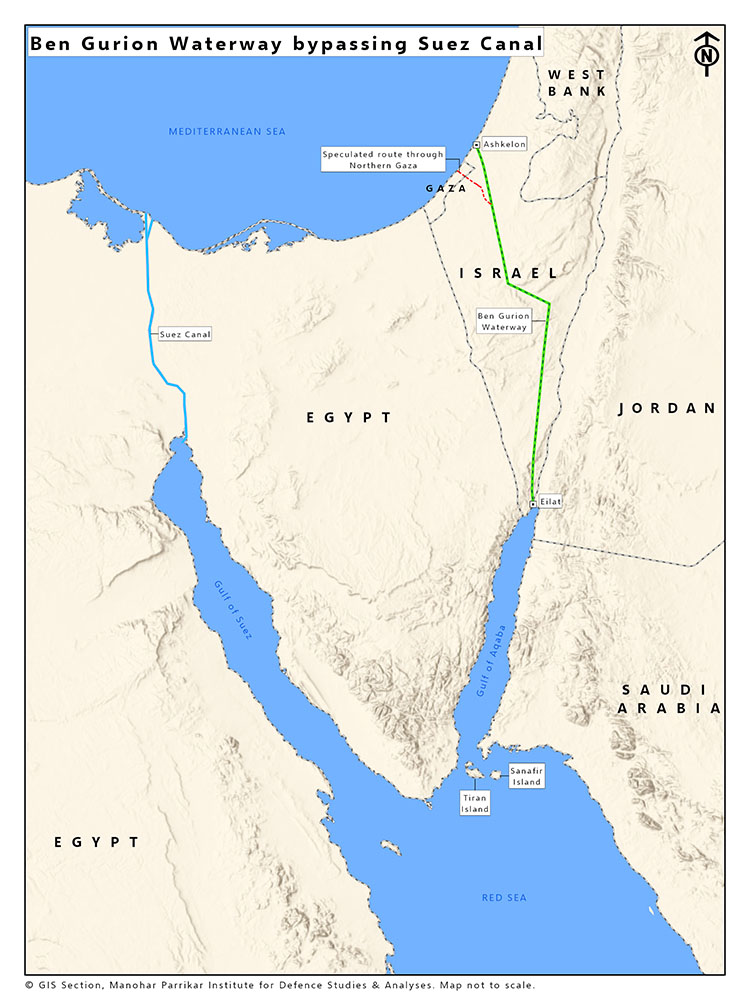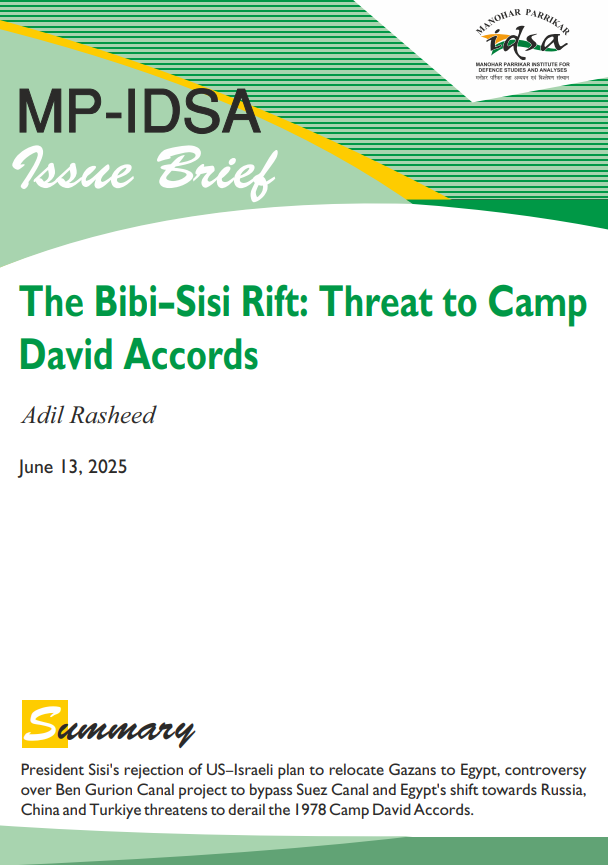The Bibi–Sisi Rift: Threat to Camp David Accords
- June 13, 2025 |
- Issue Brief
Summary
President Sisi’s rejection of US–Israeli plan to relocate Gazans to Egypt, controversy over Ben Gurion Canal project to bypass Suez Canal and Egypt’s shift towards Russia, China and Turkiye threatens to derail the 1978 Camp David Accords.
Egypt, once celebrated as the socio-political nerve centre of the Arab world, seems to be witnessing a decline in its geopolitical stature even in its immediate neighbourhood in recent decades, owing to its economic hardships and the rise of Islamist movements in the region.[1] This steady marginalisation of Egypt came into sharp focus when it did not feature in US President Donald Trump’s recent tour of Arab countries. President Abdel Fattah El-Sisi was also not invited to the US–Gulf summit in Riyadh held in May 2025.
It might be argued that Trump was not on a grand tour of West Asia but was mainly visiting GCC (Gulf Cooperation Council) states in May 2025. It is also speculated that the US president avoided visiting Cairo as Sisi had recently turned down the US–Israeli plan to relocate Gazans to Egypt and Jordan,[2] rejected Trump’s demand for free passage of US ships through the Suez Canal[3] and even refused military assistance to US–Israeli operations against the Houthis.[4]
In fact, Sisi had himself cancelled a planned visit to Washington earlier in order to supposedly avoid discussing the US–Israeli Gaza plan with Trump. In any case, US–Egypt relations have hit a new low amid reports that the Washington plans to reduce Egypt’s US$ 1.3 million annual military aid[5]—linked to the 1978 Camp David Accords and the 1979 Israel–Egypt peace treaty[6]—on account of Cairo’s growing military ties with Beijing.[7] In fact, Egypt’s increasing antipathy towards the US is viewed with respect to its growing acrimony with the Netanyahu government over the ongoing Gaza war, and the alleged build-up of its military across the 200 km border with Israel.
Egypt’s Military Build-up near Gaza Border
In late March 2025, members of the Israeli Knesset expressed concerns over the build-up of Egyptian military forces in the Sinai, which Israeli officials claim exceed the limits set by the 1979 peace treaty between the two countries.[8] Writing in the Jerusalem Post in late May, Brigadier General Yitzhak Brik of the IDF (Reserve) wrote:
As per the peace treaty, Egypt can have one mechanized division and a tank brigade in the Sinai Peninsula, totalling 47 battalions and 300 tanks. However, Egypt now has approximately 180 battalions in Sinai—nearly four times the treaty’s limit.[9]
The Camp David Accords of 1978 are often seen as the cornerstone of Israeli-Arab relations, which has withstood several regional challenges and clashes between Palestinian factions and Israel. However, it is for the first time that Egyptian government officials have started threatening to scrap the treaty following Israel’s war in Gaza triggered by the Hamas-led 7 October terror attacks.
The first indication of the threat to Israel–Egypt peace treaty of 1979 came in January 2024, when the Egyptian government warned Israel that any planned occupation of the Philadelphi Corridor (a 100 metre wide and 14 km long strip of land between Gaza and Egypt) by Israeli forces would be a violation of the 1978 Camp David Accords.
Later in February 2024, when the Netanyahu government informed Egypt that it had planned to launch a ground operation in Gaza’s southern city of Rafah, Egyptian officials reportedly warned that “if even one Palestinian refugee crosses over (into Egypt)—the peace agreement (of 1979) will be nullified.”[10]
Tensions between the two sides rose in September last year, when Israel eventually took control of the Philadelphi Corridor and Israeli Prime Minister Benjamin Netanyahu (popularly known as Bibi) said that Hamas had been using tunnels under the border to smuggle arms and rebuild its military machine.
Israeli prime minister even clarified that IDF forces shall not withdraw from the corridor until the smuggling is effectively stopped.[11] Thus, Netanyahu implicitly dismissed Egypt’s demand for giving a clear timeline about Israeli troop withdrawal from the Philadelphi corridor.[12] For their part, Egyptian officials insisted that there remained no existing tunnels in the Philadelphi corridor as their forces had destroyed hundreds of them on their side of the border years ago. To further allay US–Israeli concerns, Sisi even hailed the 1978 Camp David Accords as “a model for lasting peace” at the Arab Summit on 4 March 2025.
Yet, that assurance was soon offset by a lawsuit filed by a human rights advocate Mahmoud Hassanein at Egypt’s Administrative Court in late April 2024, which demands the Egyptian President to call for a national referendum on the continuance of the 1978 Camp David Accords. The filing of such a lawsuit that challenges the policies of the ruling Egyptian president is rare in Egypt and the development shows growing disquiet within Egyptian society and political circles against the ongoing Gaza war and the simmering resentment towards the country’s 1979 peace treaty with Israel.[13]
Although Egypt is the only country aside from Israel that has a border with Gaza, yet President Sisi has refused to give Palestinian refugees displaced by Israel asylum in his country, by calling the US–Israeli suggestion to this effect a “red line” that, if crossed, would “liquidate the Palestinian cause”. On the one hand, Egypt does not want to be seen in the Arab world as party to Israel in supporting the so-called “ethnic cleansing” of Gazans.
At the same time, Egypt also fears that by giving Gazans asylum, elements of Hamas (an offshoot of Muslim Brotherhood that is banned in Egypt) could set up a new base inside its territory for launching terrorist operations against Israel. This would provide Israel the justification to conduct military strikes inside Egyptian territory, in the name of counter-terrorism operations. In fact, President Sisi has only recently achieved success in clamping down on Islamist insurgents in northern Sinai region after several years, and does not want the victory to go to waste by bringing in Hamas elements along with Gazan refugees into Sinai.[14]
Ben Gurion Waterway: Israel’s Alternative to Suez Canal
Egypt also opposes Israel’s alleged plan to permanently expel Palestinians from Gaza in light of the news that Netanyahu government is planning to dig up a channel (named as the Ben Gurion Canal) as an alternative to the Suez Canal, which would join the Red Sea through the Israeli port city of Eilat on the Gulf of Aqaba to Ashkelon coast on the Mediterranean Sea.[15] It has been reported that Israel on 2 April 2021 had announced plans to begin work on the Ben Gurion Canal.[16]
In order to understand Egypt’s unease over the building of an alternate waterway bypassing the Suez Canal, it is noteworthy that the Red Sea forks into two gulfs—the western Gulf of Suez leading to the Suez Canal and then the northeastern arm of Red Sea, called the Gulf of Aqaba, east of Sinai Peninsula and the west of the Arabian Peninsula. Its coastline is divided among four countries—Egypt, Israel, Jordan and Saudi Arabia. It is on the northernmost tip of the Gulf of Aqaba that Israel has its only port on the Red Sea, the Port of Eilat, which has recently been the target of many Houthi missiles.[17]
Arab media is replete with conspiracy theories that Israel wants to shorten the route of the highly expensive Ben Gurion Canal project (first conceived in late 1960s), by diverting the proposed linking up of Eilat port to Ashkelon on the Mediterranean by diverting the canal route through northern Gaza in order to shorten it. Thus, Sarah Khalil writes in The New Arab news portal:
With Gaza razed to the ground, there have been alleged plans to literally cut corners and reduce costs by diverting the canal straight through the middle of the Palestinian enclave.[18]
Notwithstanding Arab media allegations that Gaza is being evacuated to use the territory for shortening the route of a highly expensive Israeli canal project, the bypassing of the Suez Canal by Israel’s own waterway would itself deal a body blow to Egypt’s vital economic and strategic interests. These apprehensions recently peaked when it was alleged by Arab media commentators that Saudi Arabia is forcing Egypt into accepting the presence of military bases on the two strategically important islands of Tiran and Sanafir, which lie at the southern entrance of the Gulf of Aqaba, where Israel’s Eilat port is located.[19]
It is important to note here that in 2016, Egypt ceded the two islands of Tiran and Sanafir to Saudi Arabia, in spite of massive public protests within the country against the decision, in exchange for Riyadh’s promised aid and investment. That controversy has revived again with a group of 57 lawyers filing a petition in an Egyptian court over their government’s 2016 decision to transfer the sovereignty of the Red Sea islands to Saudi Arabia.[20]
Tilt towards Russia, China, Turkiye: Turmoil in Horn of Africa
In the wake of such public unrest, Egypt appears to be gradually moving away from its erstwhile allies—the US and Israel—and is forging important economic and defence-related deals with China, Russia and a more Islamist Turkiye. Thus, Egypt has been steadily expanding its trade and investment ties with Russia, and is reportedly reducing its reliance on US dollar transactions.[21] Russia is helping Egypt build on its soil a joint industrial zone named Sun City, which will provide for special incentives to Russian companies.[22] Again, Russia is a significant supplier of defence equipment and weapons to Egypt and is also constructing a nuclear power plant for the Arab state.[23] Russian tourists throng Egyptian tourism sites and have reported an increase by 45 per cent this summer.[24]
However, the US is particularly disturbed by Egypt’s growing relations with China, which expands to multiple domains, including economics, diplomacy and defence. In fact, China has been Egypt’s largest trading partner for several years[25] and the two countries recently celebrated their “golden decade” of comprehensive strategic partnership.[26] China’s rising investment and industrial collaboration is particularly noteworthy in the Suez Canal Economic Zone.[27] On 22 April, Egypt and China conducted their first joint air force drills dubbed ‘Eagles of Civilization 2025’.[28] Egypt is reportedly also evincing interest in acquiring China’s J-35 fifth generation stealth fighter, indicating a potential shift in its military procurement away from the United States.[29]
In a dramatic turnaround, Sisi has also made friends with one of his worst critics in Turkish President Recep Tayyip Erdogan. Egypt–Turkey relations had deteriorated after the ousting of Egyptian President Mohamed Morsi in 2013 in a coup by the then General Sisi. In fact, Erdogan had sworn never to meet Sisi and had called his takeover a coup, which resulted in the two countries expelling each other’s ambassadors.
However, Qatar played a significant role in recent years to bring the two sides together and relations have vastly improved in the wake of their growing anti-Israeli stance over the Gaza crisis. Egypt and Turkiye may still have differences over Libya, but they seem to stand together when it comes to Ethiopia over the GERD (Grand Ethiopian Renaissance Dam) project on the Blue Nile,[30] Ankara is also not averse to Cairo backing the Islamist Sudanese Armed Forces (SAF), which is opposed to US allies like the UAE that back the rival Rapid Support Forces (RSF).[31]
Egypt’s rapprochement with Turkiye and initial stages of a prospective thaw with even Iran[32] is happening when Shia and Sunni terrorist groups, namely the Houthis and Salafi-jihadist Al-Shabaab, are increasing their collaboration across the Red Sea, and have entered into a pact on intelligence and security matters.[33] Thus, Egypt, Turkiye and Iran are increasing their combined influence around the Horn of Africa that could potentially have significant impact on the security of the globe’s vital maritime and naval chokepoints.
Views expressed are of the author and do not necessarily reflect the views of the Manohar Parrikar IDSA or of the Government of India.
[1] Shady ElGhazaly Harb, “Why Egypt is Growing More Unstable Fast”, Journal of Democracy, February 2024; “Sisi Woos Trump and Manoeuvres Around the Gulf”, MEMO – Middle East Monitor, 3 June 2025.
[2] Nayera Abdallah, Nadine Awadalla and Mohamed Wali, “Egypt’s Sisi Rejects Transfer of Gazans, Discusses Aid with Biden”, Reuters, 19 October 2023.
[3] “Trump Asked Sisi for Free Passage through Suez Canal, Military Support Against Houthis: Report”, Middle East Eye, May 2025.
[4] “Egypt Denies Assisting Israel’s Military Operations Amid Reports about Explosives Shipment”, Reuters, 1 November 2024.
[5] “Egypt’s President Sisi to Stay Away from White House if Gaza Displacement on Agenda”, Reuters, 13 February 2025.
[6] Yaarov Katz, “Is the Camp David Peace at Risk? Opinion”, The Jerusalem Post, 7 March 2025.
[7] Mariam Wahba and Ryan Brobst, “US Policymakers Beware: Egypt’s Relationship with China is Preparing for Takeoff”, Breaking Defense, 15 May 2025.
[8] “Israelis Express Concerns Over ‘Unusual’ Egyptian Military Movements in Sinai”, MEMO – Middle East Monitor, 28 March 2025.
[9] Brigadier General Yitzhak Brik, “Israel Facing Dangerous Shift in Relations with Egypt: Opinion”, The Jerusalem Post, 27 May 2025.
[10] Mariam Wahba, “Egypt’s Sisi: Camp David is a Model for Lasting Peace”, Policy Brief, Foundation for Democracy (FDD), 12 March 2025.
[11] Josef Federman, “Netanyahu Demands Open-ended Control of Gaza’s Border with Egypt”, Associated Press, 5 September 2024.
[12] Ibid.
[13] Abdul Karim Salim, “Lawsuit in Egypt Demands Sisi Put 1979 Israel Peace Treaty to Referendum”, The New Arab, 23 April 2025.
[14] “Why Egypt Refuses to Open its Border to Palestinians”, News and Opinion, The University of Sydney website, 27 February 2024.
[15] Beppi Pezzulli, “The Ben Gurion Canal: Vision Amidst Upheaval”, The Times of Israel, 26 April 2024.
[16] Frank Musmr, “The Ben Gurion Canal: Multi-billion-dollar Investment Project”, Global Arab Network, 22 April 2024; Matija Šerić, “The Ben Gurion Canal: Israel’s Potential Revolutionary Alternative to Suez – Analysis”, Eurasia Review, 17 November 2023.
[17] Ilana Curiel, “Eilat Port Lays Desolate Amid Houthi Threat”, Ynetnews.com, 21 December 2024.
[18] Sarah Khalil, “What is Israel’s Ben Gurion Canal Plan and Why Gaza Matters”, The New Arab, 17 November 2023.
[19] Taqadum al-Khatib, “Tiran and Sanafir: Red Sea Islands are Now a Chokehold Over Egypt’s Security”, Middle East Eye, 4 June 2025.
[20] Mada Masr, “Lawyers Reignite Fight Against Govt’s Transfer of Tiran, Sanafir Islands to Saudi Arabia”, Al Arabia, 4 May 2025.
[21] Pradeep Kumar, “Egypt and Russia Increase Trade After Record 2024”, Arabian Gulf Business Insight (AGBI), 12 May 2025.
[22] “Egypt Set to Host Sun City, Russia’s Unprecedented Industrial Hub”, Egypt Independent, RT Arabic, 17 May 2025.
[23] “Putin, Sisi Mark New Phase of Egypt’s Russian-built Nuclear Plant”, Reuters, 23 January 2024.
[24] “Egypt Sees Travel Boom this Summer: Forty Five Percent Surge in Russian Tourists…”, Travel Tour World, 10 June 2025.
[25] “Egypt-China Ties Grow Stronger Over 10 Years of Comprehensive Strategic Partnership”, english.gov.cn, The State Council, The People’s Republic of China, 31 December 2024.
[26] Jonathan Fulton, “What’s Behind Egypt and China’s ‘Golden Decade’ of Partnership”, Atlantic Council, 8 January 2025.
[27] Nadia Helmy, “How the Belt and Road Initiative is Transforming Egypt and the Suez Canal Economic Zone”, Modern Diplomacy, 28 March 2025.
[28] Agnes Helou, “In a First, Egypt Conducts Military Drills with China, Signaling Closer Ties”, Air Warfare, Global Defense, 22 April 2025.
[29] “Egypt’s Air Force Chief Eyeing Chinese J-35 Stealth Fighter”, Aero-News Journal, 26 May 2025.
[30] Jihad Mashamoun, “Sudanese-Egyptian Military Relations and Geopolitics: Implications for Powering the GERD”, African Arguments, 17 December 2020.
[31] Shlomi Michaels, “The Deadly Domino Effect of Islamism in the Horn of Africa”, Jerusalem Center for Security and Foreign Affairs, 4 May 2025.
[32] Aseel Saleh, “Iran, Egypt Initiate a New Chapter of Rapprochement Amid Growing Regional Tensions”, Peoples Dispatch, 6 June 2025.
[33] Ibrahim Jalal and Adnan al-Jabarni, “Dhows, Drones, and Dollars: Ansar Allah’s Expansion into Somalia”, Carnegie Endowment for International Peace, 14 March 2025.







